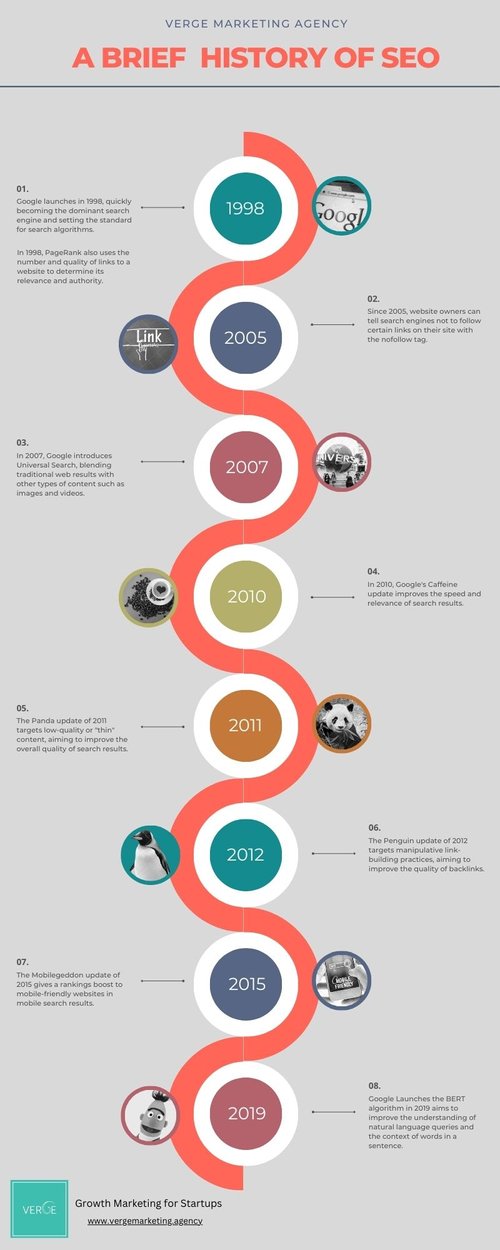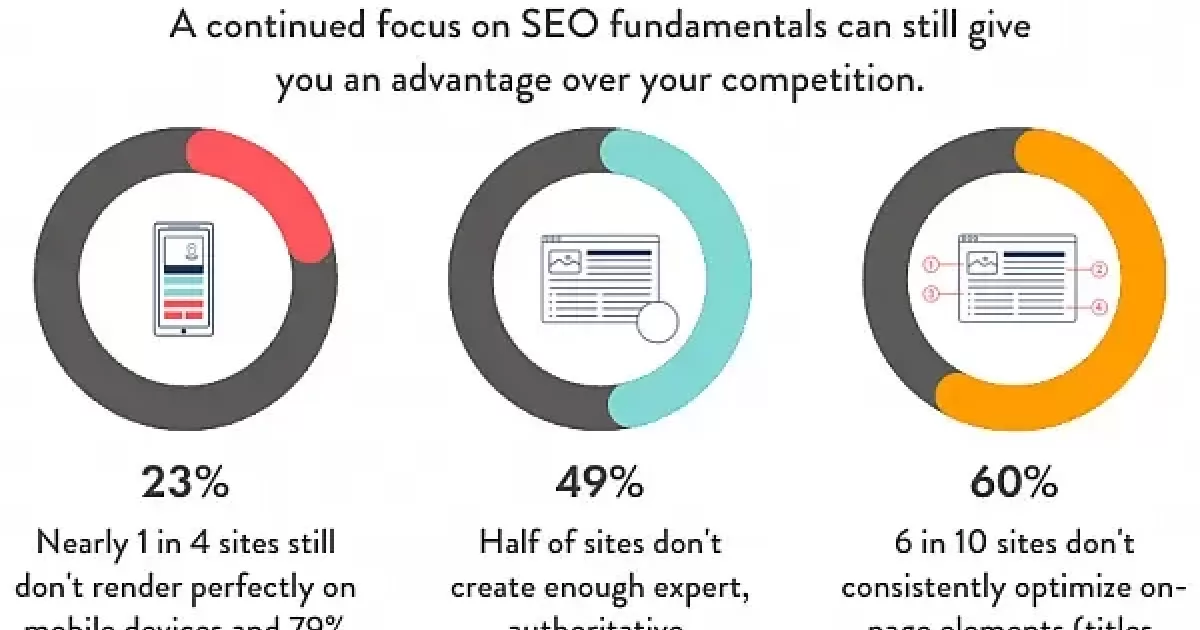Uncover the secrets behind SEO’s evolution and how it continues to shape the digital landscape in unexpected ways today.

Image courtesy of via DALL-E 3
Table of Contents
Welcome to the world of SEO! Have you ever wondered how websites show up when you search for something on Google or other search engines? Well, that’s all thanks to SEO. In simple terms, SEO, which stands for Search Engine Optimization, helps websites become more visible online.
What is SEO?
SEO is like a magic spell that helps websites appear on the first page of search results when you look for something online. It’s like having a secret code that makes sure your favorite websites get noticed by people like you.
Why Learn about SEO?
Learning about SEO is like unlocking the secrets of the internet. Even if you’re not building websites, it’s cool to know how certain sites become super popular. Plus, understanding SEO can help you find what you’re looking for faster and easier.
The Early Days of SEO
In the early days of the internet, SEO, or Search Engine Optimization, was just starting to take shape. It was the 1990s, and people were beginning to realize the importance of getting their websites to show up on search engines like Google and Yahoo. Let’s take a trip down memory lane and explore how SEO first began.
Birth of SEO
SEO has been around since the early days of the internet when search engines were in their infancy. Back then, search engines like AltaVista ruled the web. Website owners began to understand that they needed to optimize their sites to be more visible in these search results. This marked the birth of SEO as we know it today.
Keyword Stuffing
One common practice in the early days of SEO was something called keyword stuffing. This involved cramming as many keywords onto a webpage as possible in an attempt to trick search engines into ranking the site higher. While this tactic might have worked initially, it was not sustainable in the long run.
Web Directories
Before Google became the dominant search engine, web directories like Yahoo Directory played a crucial role in organizing the web. These directories allowed users to browse categories and find websites related to their interests. Website owners would submit their sites to these directories to gain more visibility online.
The Rise of Google
Google, a name we all know and love, played a significant role in changing how websites show up on the internet. Let’s dive into how Google rose to prominence and made a huge impact on SEO.
Google Enters the Scene
Founded by Larry Page and Sergey Brin, Google started off small but quickly became a giant in the world of search engines. What made Google different was its focus on providing users with the most relevant search results.
PageRank Explained
PageRank is like a voting system for websites. The more websites that link to yours, the more important Google thinks your website is. This system helped Google decide which pages were the best to show users.
Importance of Backlinks
Backlinks are links from other websites that point to yours. Google saw these links as a vote of confidence in your content. The more high-quality backlinks you had, the more Google trusted your website to be a reliable source of information.
The Evolution of SEO Techniques
As the internet grew, so did the techniques used to improve a website’s visibility on search engines like Google. Let’s dive into how SEO methods have evolved over the years.

Image courtesy of mangools.com via Google Images
White Hat vs. Black Hat SEO
There are two main types of SEO practices: White Hat and Black Hat. White Hat SEO focuses on following search engine guidelines and creating quality content to improve rankings. On the other hand, Black Hat SEO employs shady tactics like keyword stuffing and buying links to deceive search engines.
Algorithm Updates
Search engines like Google regularly update their algorithms to provide users with the most relevant and high-quality search results. These updates can impact how websites are ranked and emphasize the importance of following best SEO practices.
Importance of Quality Content
One key aspect of modern SEO is the emphasis on creating high-quality, original content. Search engines prioritize websites that offer valuable information to users, so having engaging and informative content is crucial for SEO success.
Modern-Day SEO
As the internet continues to evolve, so does the way websites are found and ranked on search engines like Google. Let’s explore some of the newer aspects of SEO that are shaping the online world today.
Mobile SEO
Mobile SEO is all about making sure websites work well and look great on your phone or tablet. This is super important because many people use their phones to search for things online. Websites that are mobile-friendly tend to rank higher on search engines.
Voice Search
Have you ever asked Siri or Alexa a question instead of typing it in? That’s voice search, and it’s changing the way SEO works. Websites now need to be optimized for voice searches to make sure they show up when someone asks a question out loud.
User Experience
User experience is all about how easy and enjoyable a website is to use. Search engines like Google pay attention to this because they want to show websites that people like. Websites that are well-designed and easy to navigate often rank higher in search results.
Understanding SERPs
SERPs stand for Search Engine Results Pages. These are the pages you see after you search for something on Google. The websites that show up on these pages are ranked based on their relevance and quality. Understanding SERPs helps you know why some websites appear at the top of search results.
The Role of Social Media in SEO
Social media plays a significant role in how websites appear on search engines like Google. Let’s explore how social media impacts SEO.

Image courtesy of beithoven.com via Google Images
Social Signals
Social signals are actions on social media platforms like likes, shares, and comments that signal to search engines that a website is popular and valuable. When a website receives a lot of social signals, search engines view it more favorably, helping it rank higher in search results.
Engagement
Engagement on social media refers to interactions like likes, shares, and comments. When people engage with a website’s content on social media, it shows that the content is relevant and valuable. This engagement can boost the site’s SEO by increasing its authority and visibility on search engines.
Content Sharing
Sharing content from a website on social media platforms can drive traffic back to the site. When users share content they like, it reaches a wider audience and generates more visits to the website. Increased traffic and visibility from social media sharing can have a positive impact on the website’s SEO by improving its online presence and authority.
The Future of SEO
As we look ahead to the future of SEO, exciting changes are on the horizon. Let’s explore some trends that may shape the way websites optimize for search engines in the years to come.
The Role of AI
One of the most significant developments in SEO is the integration of AI, or Artificial Intelligence. AI technologies are revolutionizing the way websites are ranked and optimized for search engines. These advanced systems can analyze vast amounts of data to understand user intent and deliver more relevant search results.
Machine Learning
Machine learning, a subset of AI, is also playing a crucial role in shaping the future of SEO. By learning from patterns in data, machines can continually refine and improve search algorithms. This means that SEO strategies will become more sophisticated and tailored to user preferences over time.
Future Search Engine Trends
Experts in the field are predicting exciting changes in search engine behavior. One possible trend is the rise of predictive SEO, where algorithms anticipate user queries and provide answers before they are even asked. This could revolutionize the way websites are optimized, focusing on proactive content creation to meet user needs before they arise.
Conclusion
In this journey through the history of SEO, we have explored fascinating aspects of how websites become popular on search engines like Google. Let’s recap the main points we covered and emphasize why understanding SEO is so important, even for young minds like yours.

Image courtesy of www.workshopdigital.com via Google Images
Recap
We started by defining what SEO is and why it matters for websites to show up in search results. We delved into the early days of SEO, discussing practices like keyword stuffing and the use of web directories. The rise of Google introduced us to concepts like PageRank and backlinks, shaping the way websites are ranked. We then explored how SEO techniques evolved, from White Hat to Black Hat practices, and the importance of quality content.
Modern-day SEO has brought new challenges, such as mobile optimization, voice search, and the focus on user experience. We also discussed how social media influences SEO through social signals, engagement, and content sharing. Looking towards the future, we speculate on trends like AI and machine learning reshaping the SEO landscape through predictive strategies.
Why SEO Matters
Understanding SEO is not just about knowing how websites get more visitors. It’s about grasping the fundamental principles that shape the online world. By learning about SEO, you gain insights into how information is discovered and shared, empowering you to create your digital footprint. So, remember, even as an 11-year-old, knowing about SEO is cool and valuable in today’s digital age.
Want to turn these SEO insights into real results? Seorocket is an all-in-one AI SEO solution that uses the power of AI to analyze your competition and craft high-ranking content.
Seorocket offers a suite of powerful tools, including a Keyword Researcher to find the most profitable keywords, an AI Writer to generate unique and Google-friendly content, and an Automatic Publisher to schedule and publish your content directly to your website. Plus, you’ll get real-time performance tracking so you can see exactly what’s working and make adjustments as needed.
Stop just reading about SEO – take action with Seorocket and skyrocket your search rankings today. Sign up for a free trial and see the difference Seorocket can make for your website!
Frequently Asked Questions (FAQs)
What are keywords?
In the world of SEO, keywords are like secret codes that help search engines understand what a website is about. When you search for something on Google, the words you type are keywords. Websites use these keywords to show up on search results when someone searches for them. So, if you have a website about cute puppies, you might use keywords like “adorable puppies” or “dog pictures” to help people find your site.
How do search engines work?
Search engines are like super-smart detectives on the internet. When you type something into a search engine like Google, it sends out these little programs called bots to explore all the websites on the web. These bots look for keywords and other clues to figure out which websites are the most helpful and relevant to your search. Then, they rank these websites based on how well they match what you’re looking for. The websites that do the best job of using keywords and providing useful information get to the top of the search results.
Can I do SEO for my own website?
Yes, definitely! Even at your age, you can start learning about SEO and help make your website more popular. One easy way to start is by using the right keywords in your website content. You can also think about what your friends might like to see on your site and create fun and engaging content. By sharing your website with others and getting more people to visit and interact with it, you’re already on your way to doing SEO!







